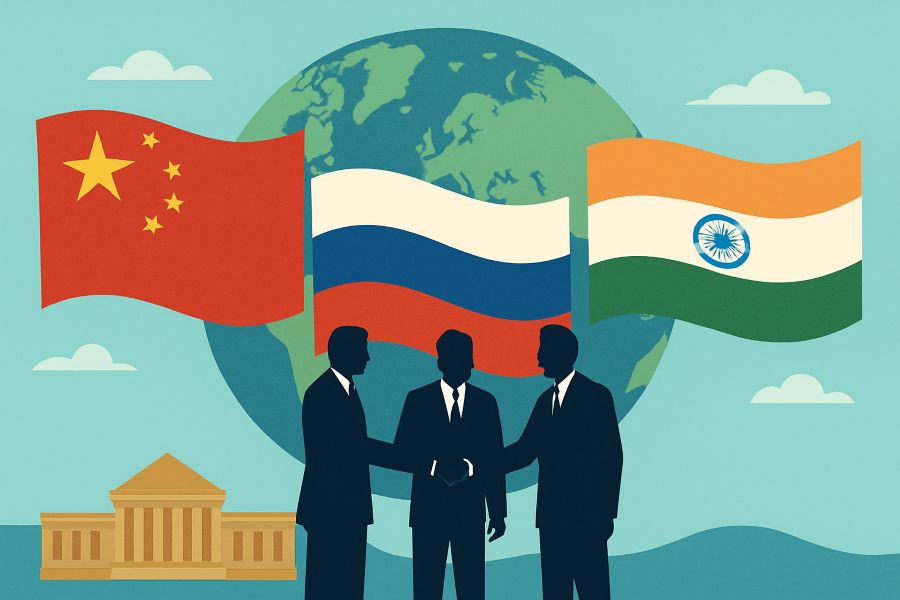China, Russia, and India Signal a Shift Toward Multipolarity at the Tianjin Summit
The recent Shanghai Cooperation Council (SCO) summit in Tianjin, China, has essentially revived the fortunes of the SCO—or, in other words, showcased the might, power, and reach of China—against the backdrop of the tariffs and sanctions upheaval created by former US President Donald Trump. At the summit, China called for the establishment of a new Global Governance Initiative to make the world more equitable.
THE SHANGHAI COOPERATION ORGANISATION (SCO), established in 2001, has not been able to make any significant impact during its 24 years of existence. Like BRICS, it often appeared as a forum for dignified pledges about regionalism and for lamenting the policies and strategies of the US-led global order.
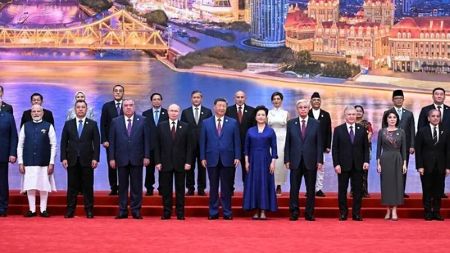
Sco Summit 2025
However, in 2025 the SCO seemed to take a major step forward through the joint efforts of Chinese President Xi Jinping and Russian President Vladimir Putin in wooing Indian Prime Minister Narendra Modi. The optics of the summit delivered a meaningful win against the US.
Recently, ties between the world’s two largest democracies have not been as warm as both partners would have liked. The first sign of the growing trust deficit appeared when, despite Trump’s claim of brokering a ceasefire between India and Pakistan in May, India repeatedly rejected any such claim.
The second irritant accelerating the souring of ties was the imposition of 50 percent punitive secondary tariffs on India as punishment for its continued import of Russian oil—despite China, Turkey, and other nations purchasing substantial quantities of the same oil from Russian firms. These actions, taken together, sent US-India relations into a diplomatic spin.
At the summit, Modi and Putin entered hand-in-hand and immediately formed a tight circle with Xi, sharing warm smiles for the cameras. Xi gave a speech denouncing “Cold War mentalities” and “bullying,” without naming Trump.

Xi later announced a “Global Governance Initiative,” calling on nations to work together for a more “just and equitable” system—one that dismantles walls rather than erecting them, and that seeks “integration, not decoupling.”
Trump’s tariffs have impacted many of the nations represented at the summit, and the group signed a declaration afterward that read like a thinly veiled swipe at the US.
In the Tianjin Declaration, the leaders stated that they opposed “unilateral coercive measures”—including economic ones—that “undermine international law” and contravene the norms of the World Trade Organisation and the UN Charter.
PM Modi described the summit as an “opportunity” for India and praised its focus on “connectivity” and trade between member states. “India has always believed that strong connectivity not only boosts trade but also opens doors to growth and trust,” Modi said.
Following this display of bonhomie, the bigger question is whether the three nations will be able to sustain their newfound closeness. Indo-Russian ties have withstood the test of time, so the more pertinent question is whether Indo-China relations will ever reach the same level, given their longstanding border rivalries.
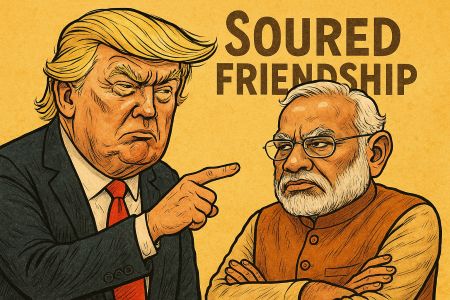 An editorial in The Guardian summed it up well: India’s calculations are straightforward. It has red lines: agriculture will not be opened to US demands; oil purchases cannot be dictated by Washington; and the ceasefire with Pakistan was conceded by Islamabad, not brokered by Trump.
An editorial in The Guardian summed it up well: India’s calculations are straightforward. It has red lines: agriculture will not be opened to US demands; oil purchases cannot be dictated by Washington; and the ceasefire with Pakistan was conceded by Islamabad, not brokered by Trump.
From Modi’s perspective, the summit demonstrated that the US cannot take India’s partnership for granted, and showed India’s willingness to seek friends elsewhere.
For China, the rewards are immediate. Trump has given Xi a stage on which to host an important multipolar gathering. Beijing sees the SCO as highlighting the US’s absence and enabling others to seize the stage.
For Russia, the cordiality showed that sanctions have not made it a pariah. For Turkey, attending the summit preserved its ambiguous position as a NATO member.
For Iran, the SCO condemned the US-Israeli attacks it suffered earlier in the summer. Essentially, the more this theatre normalises China and Russia as leaders of a non-Western bloc, the harder it becomes for Washington to muster global consensus—notably over Ukraine—in future crises.
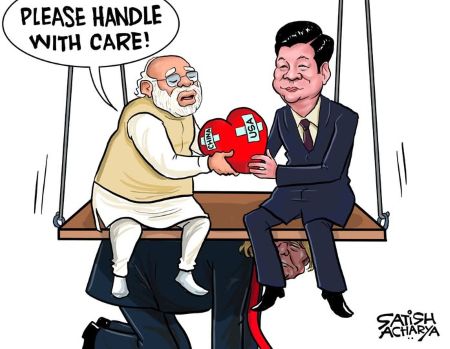 The SCO claims it is inclusive, but Beijing runs the show. In a real sense, Trump has handed Beijing the platform for its long game—building a system beyond the reach of the US. Whether this will allow more room for other states to manoeuvre remains an open question.
The SCO claims it is inclusive, but Beijing runs the show. In a real sense, Trump has handed Beijing the platform for its long game—building a system beyond the reach of the US. Whether this will allow more room for other states to manoeuvre remains an open question.
For now, however, India, Russia, and China combined pose a greater challenge to US hegemony. The SCO may never fight China’s wars, but the latest moves ensure Beijing will never stand alone. That could be the high price the West pays for Trump’s narcissistic delusions.
As far as Russia is concerned, it now stands to secure more business with India and China, its largest trade partners. Both countries have helped prop up Moscow’s economy after its invasion of Ukraine left it cut off from most Western trade.
Last year, China purchased a record of more than 100 million tonnes of Russian crude oil, almost 20 percent of its total energy imports.
Likewise, oil exports to India—insignificant before the Ukraine war—have since grown to around $140bn (£103.5bn) since 2022. Together, China and India account for the majority of Russia’s energy exports, according to the BBC.
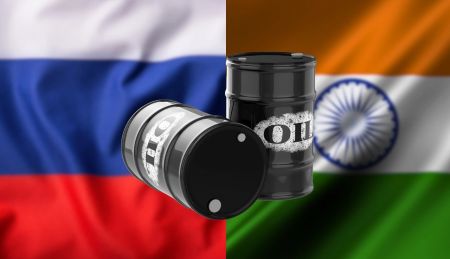
Russia relies on oil and gas exports for roughly a quarter of its budget revenues, which fund its war chest. New Delhi offered Moscow a lifeline after much of the oil displaced by Western sanctions was diverted to India, which benefited from cheaper energy.
According to Russian Foreign Minister Sergei Lavrov, the three countries’ common interests lie in developing their economies, solving social problems, and improving living standards.
Referring to the recent summit, he said: “It is a demonstration that three great powers, representing three great civilisations, are aware of their common interests in a number of areas.”
Overall, while the three countries may not be able to revive the much-speculated Russia-India-China Forum (RIC), they could grow closer at the bilateral level. Russia, in particular, may try to encourage a friendlier approach between India and China, in hopes of motivating them to emerge as larger Asian economic powers. ![]()
________
Also Read:
Trump, Tariffs and Test of Indo-US Ties
Disclaimer : PunjabTodayNews.com and other platforms of the Punjab Today group strive to include views and opinions from across the entire spectrum, but by no means do we agree with everything we publish. Our efforts and editorial choices consistently underscore our authors’ right to the freedom of speech. However, it should be clear to all readers that individual authors are responsible for the information, ideas or opinions in their articles, and very often, these do not reflect the views of PunjabTodayNews.com or other platforms of the group. Punjab Today does not assume any responsibility or liability for the views of authors whose work appears here.
Punjab Today believes in serious, engaging, narrative journalism at a time when mainstream media houses seem to have given up on long-form writing and news television has blurred or altogether erased the lines between news and slapstick entertainment. We at Punjab Today believe that readers such as yourself appreciate cerebral journalism, and would like you to hold us against the best international industry standards. Brickbats are welcome even more than bouquets, though an occasional pat on the back is always encouraging. Good journalism can be a lifeline in these uncertain times worldwide. You can support us in myriad ways. To begin with, by spreading word about us and forwarding this reportage. Stay engaged.
— Team PT

